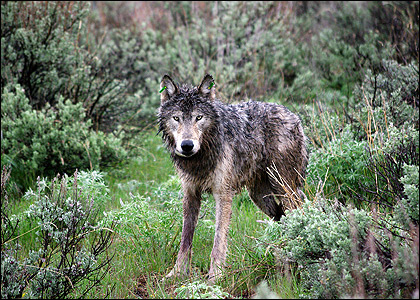Eugene Weekly’s Earth Day Issue:
Carpe the Carp Stalking the elusive *Kentucky tunain Oregon waters
Pretty, Bad Mute swans in Oregonû
Bees, Baby, Baby, Bees Nonnatives make the world go round
Dont Feed the Birds Wild turkeys are really feral
Not So Big, Not So Bad Wolves return to Oregon, cause a ruckus in Congress
Will Work for Food Nonnative earthworms move slow, compost fast
Crawfish, Crawdad, Crayfish Whatever you call them … theyre invading Oregon
Not So Big, Not So Bad
Wolves return to Oregon, cause a ruckus in Congress
By Camilla Mortensen
To follow a certain Tea-Partyesque line of thought: God created the animals, Adam named the ones he was given dominion over (the beasts of the field and such) and, with a quick leap forward to the present day, Congress decides which ones are no longer in danger of dying out ‹ûwolves, for example.
 |
| photo by odfw |
Wolves are native to the western U.S. and to Oregon, but they were extirpated ‹ûhunted to local extinction ‹ by the late 1940s. The current northern Rockies gray wolves are descendants of those that crossed the border from Canada into Glacier National Park as well as wolves that were brought from Canada and reintroduced to Yellowstone and Idaho. Genetic testing by the Oregon Department of Fish and Wildlife shows eight of nine Oregon wolves tested are from the Idaho pack.û
While wolves in Oregon are still sparse ‹ûthere are only about 23 ‹ theyve made a good recovery elsewhere in the West, says Oregon State University wolf scholar Cristina Eisenberg. Eisenberg, author of The Wolfs Tooth, says despite human fears about wolves, the animals are actually a økeystone species” in the ecosystem. Removal of a top predator, like the wolf, can cause a øtrophic cascade” and trigger effects on the rest of the system.
øBiodiversity plummets,” Eisenberg says. Without wolves there are more elk, which eat more streamside vegetation, which affects the songbirds and butterflies that live there, and the fish in the streams that need the shade from the plants. Eisenberg says that though the current Oregon wolves may not be the exact subspecies that used to live here, they are the same species and fill the same important ecological niche.û
Many wolf advocates were dismayed this month when Democratic Sen. John Tester of Montana inserted language into the already controversial budget bill that delisted wolves from federal Endangered Species Act protections, returning their management in Montana and Idaho to those states, which would allow them to be hunted.û
The rider overrides a federal judges decision forbidding this same delisting, and it blocks judicial review of the decision to withdraw the federal protections. The fact that the delisting was a congressional decision superseding the Endangered Species Act raises hackles among conservationists.
But Andy Stahl, executive director of Forest Service Employees for Environmental Ethics, says this is not the first time Congress has used a rider to overturn environmental laws. øThis tactic used on the wolf this week is by no means novel or unprecedented,” he says.
Stahl says, øThose with long memories remember that Congress did overturn the environmental laws in regard to spotted owl.” He says that Oregon Sen. Mark Hatfield, using his chairmanship of the Appropriations Committee, removed all protections for a one-year period around 1991. Stahl also points to the snail darter, a small species of endangered fish that was exempted from the ESA in order to build a dam in Tennessee.û
The consequences, Stahl says, øto the wolves, the snail darter, the owl are all the same: more dead owls, more dead wolves, more dead snail darters.” The effects of the rider arent yet set in stone ‹û its wording doesnt prevent U.S. Fish and Wildlife from relisting the wolf if it plummets and faces extirpation, Stahl says.û
øIts somewhat remarkable how thoroughly environmental interests lost,” Stahl says. He points out that two of the senators who pushed for delisting as Congress and the White House began to gear up for the 2012 elections, Tester and Amy Klobuchar of Minnesota, are from states with wolf populations and are øtwo freshman Democratic senators, almost an endangered species themselves.”